Seventh Circuit Defines Accrual Date Under 'Heck v. Humphrey'
The Seventh Circuit reviewed a series of its prior decisions applying 'Heck', repudiating the reasoning of some and overruling others.
February 19, 2020 at 09:58 AM
6 minute read
 Michael T. Brody, co-chair of Jenner & Block.
Michael T. Brody, co-chair of Jenner & Block.
In Savory v. Cannon, 947 F.3d 409 (7th Cir. Jan. 7, 2020) (en banc), the U.S. Court of Appeals for the Seventh Circuit, sitting en banc, applied the U.S. Supreme Court's decision in Heck v.  Humphrey, 512 U.S. 477 (1994), and held that Johnny Lee Savory's civil rights lawsuit, which implicated the validity of his criminal conviction, accrued at the time of Savory's gubernatorial pardon. It was the pardon, not an earlier event such as Savory's release from prison or the commutation of his sentence, that constituted a favorable termination of his criminal proceeding and permitted suit. In reaching this conclusion, the Seventh Circuit reviewed a series of its prior decisions applying Heck, repudiating the reasoning of some and overruling others.
Humphrey, 512 U.S. 477 (1994), and held that Johnny Lee Savory's civil rights lawsuit, which implicated the validity of his criminal conviction, accrued at the time of Savory's gubernatorial pardon. It was the pardon, not an earlier event such as Savory's release from prison or the commutation of his sentence, that constituted a favorable termination of his criminal proceeding and permitted suit. In reaching this conclusion, the Seventh Circuit reviewed a series of its prior decisions applying Heck, repudiating the reasoning of some and overruling others.
The facts in Savory are easily summarized. Savory was convicted of a serious crime. After nearly 30 years in prison, he was paroled. Five years later, his sentence was commuted. Three years after that, and 38 years after his original arrest, the governor of Illinois pardoned Savory. (By way of disclosure, my firm represented Savory in prior proceedings, including in clemency proceedings that resulted in a pardon from the governor. We do not represent Savory in his civil rights lawsuit.) Less than two years after the pardon (the statute of limitations is two years), Savory sued the arresting officers and their municipal employer alleging the officers had subjected him to abusive interrogation, fabricated evidence, wrongfully coerced a false confession, and suppressed and destroyed evidence. The defendants asserted that Savory filed his lawsuit too late. They argued the claim accrued when his sentence was commuted and he was free to file suit then. Savory contended it was only the later pardon that permitted his lawsuit to proceed. The district court agreed with the defendants and dismissed the case. The en banc Seventh Circuit reversed.
The Seventh Circuit's analysis of the accrual date for Savory's claim began with Heck, in which the Supreme Court ruled, there addressing a claim the court described as analogous to a claim for malicious prosecution, that a claim for damages that would necessarily imply a conviction or sentence was unconstitutional does not accrue until the conviction or sentence is terminated favorably for the criminal defendant. Before the invalidation of the conviction or sentence, the convicted person's federal remedy is to pursue a claim for post-conviction relief from the conviction or sentence, such as under Sections 2254 or2255. Recently, in McDonough v. Smith, 139 S. Ct. 2149 (2019), the Supreme Court held a Section 1983 claim for fabricating evidence in a criminal prosecution accrued upon acquittal. Applying these principles, the Seventh Circuit held that where civil rights claims imply the invalidity of a conviction, a Section 1983 claim does not accrue until the conviction is reversed, expunged, declared invalid or called into question by the issuance of a writ of habeas court. In Savory's case, it was the pardon that favorably terminated the conviction. The court observed that permitting claims to accrue at an earlier date would result in those claims being "dead on arrival" in virtually every case. Because federal courts give preclusive effect to state court judgments whenever the state court would do so, a plaintiff's claim in any Section 1983 case that calls into question the validity of the underlying conviction would be precluded by the prior criminal conviction until such time of that conviction is set aside.
The court's analysis was complicated by prior Seventh Circuit decisions suggesting termination of custody can give rise to a Section 1983 claim. Those cases suggested that the Heck bar applied if a plaintiff had an available remedy in habeas, but failed to pursue it. Clarifying its prior cases, the Seventh Circuit held a Section 1983 claim involving the validity of a prior conviction or sentence accrues upon the favorable termination of the criminal proceeding, not when habeas relief becomes unavailable for some reason. The court rejected its prior decisions that focused on unsuccessful pursuit of collateral review. Heck's rule is simpler: A plaintiff may bring an action that calls into question a prior criminal conviction or sentence only after the former prisoner has obtained a favorable termination of the prior conviction or sentence.
Judge Frank Easterbrook dissented. He concluded that a prisoner's release from prison is the appropriate date of accrual of a Section 1983 claim, even if the underlying criminal judgment remained unaltered. Easterbrook recognized that a criminal conviction is a judgment that the criminal defendant may not contradict in another court. He concluded the preclusion doctrine should not dictate the accrual rule. The preclusive effect of a state criminal judgment is a matter of state law, not federal law, and it does not influence the accrual rule applicable to a federal statute.
The en banc court's ruling limits Section 1983 claims implicating the validity of underlying criminal convictions to those cases in which the plaintiffs have obtained a favorable termination of the original criminal case, which may be a rare event. In Savory's case, his claim did not accrue until he was pardoned by the governor. While this accrual rule may postpone the accrual of claims, requiring a plaintiff to sue at an earlier accrual date, such as release from prison as Easterbrook suggested in his dissent, would not be a plaintiff-friendly result. Those lawsuits would be, to use the en banc court's words, "dead on arrival" because the prior criminal conviction would remain a preclusive bar to recovery.
Heck has spawned much litigation about what constitutes a favorable termination, and what causes of action implicate the validity of a criminal conviction or sentence. The Seventh Circuit has now conclusively ruled for cases subject to the Heck bar, the cause of action accrues upon a favorable termination of the underlying criminal case, not just release from prison.
Michael T. Brody is a partner at Jenner & Block. Brody serves as co-chair of the firm's appellate and Supreme Court practice and co-chair of its class action practice.
This content has been archived. It is available through our partners, LexisNexis® and Bloomberg Law.
To view this content, please continue to their sites.
Not a Lexis Subscriber?
Subscribe Now
Not a Bloomberg Law Subscriber?
Subscribe Now
NOT FOR REPRINT
© 2025 ALM Global, LLC, All Rights Reserved. Request academic re-use from www.copyright.com. All other uses, submit a request to [email protected]. For more information visit Asset & Logo Licensing.
You Might Like
View All
Apple Files Appeal to DC Circuit Aiming to Intervene in Google Search Monopoly Case
3 minute read
A Plan Is Brewing to Limit Big-Dollar Suits in Georgia—and Lawyers Have Mixed Feelings
10 minute read
Trending Stories
- 1The Law Firm Disrupted: Scrutinizing the Elephant More Than the Mouse
- 2Inherent Diminished Value Damages Unavailable to 3rd-Party Claimants, Court Says
- 3Pa. Defense Firm Sued by Client Over Ex-Eagles Player's $43.5M Med Mal Win
- 4Losses Mount at Morris Manning, but Departing Ex-Chair Stays Bullish About His Old Firm's Future
- 5Zoom Faces Intellectual Property Suit Over AI-Based Augmented Video Conferencing
Who Got The Work
J. Brugh Lower of Gibbons has entered an appearance for industrial equipment supplier Devco Corporation in a pending trademark infringement lawsuit. The suit, accusing the defendant of selling knock-off Graco products, was filed Dec. 18 in New Jersey District Court by Rivkin Radler on behalf of Graco Inc. and Graco Minnesota. The case, assigned to U.S. District Judge Zahid N. Quraishi, is 3:24-cv-11294, Graco Inc. et al v. Devco Corporation.
Who Got The Work
Rebecca Maller-Stein and Kent A. Yalowitz of Arnold & Porter Kaye Scholer have entered their appearances for Hanaco Venture Capital and its executives, Lior Prosor and David Frankel, in a pending securities lawsuit. The action, filed on Dec. 24 in New York Southern District Court by Zell, Aron & Co. on behalf of Goldeneye Advisors, accuses the defendants of negligently and fraudulently managing the plaintiff's $1 million investment. The case, assigned to U.S. District Judge Vernon S. Broderick, is 1:24-cv-09918, Goldeneye Advisors, LLC v. Hanaco Venture Capital, Ltd. et al.
Who Got The Work
Attorneys from A&O Shearman has stepped in as defense counsel for Toronto-Dominion Bank and other defendants in a pending securities class action. The suit, filed Dec. 11 in New York Southern District Court by Bleichmar Fonti & Auld, accuses the defendants of concealing the bank's 'pervasive' deficiencies in regards to its compliance with the Bank Secrecy Act and the quality of its anti-money laundering controls. The case, assigned to U.S. District Judge Arun Subramanian, is 1:24-cv-09445, Gonzalez v. The Toronto-Dominion Bank et al.
Who Got The Work
Crown Castle International, a Pennsylvania company providing shared communications infrastructure, has turned to Luke D. Wolf of Gordon Rees Scully Mansukhani to fend off a pending breach-of-contract lawsuit. The court action, filed Nov. 25 in Michigan Eastern District Court by Hooper Hathaway PC on behalf of The Town Residences LLC, accuses Crown Castle of failing to transfer approximately $30,000 in utility payments from T-Mobile in breach of a roof-top lease and assignment agreement. The case, assigned to U.S. District Judge Susan K. Declercq, is 2:24-cv-13131, The Town Residences LLC v. T-Mobile US, Inc. et al.
Who Got The Work
Wilfred P. Coronato and Daniel M. Schwartz of McCarter & English have stepped in as defense counsel to Electrolux Home Products Inc. in a pending product liability lawsuit. The court action, filed Nov. 26 in New York Eastern District Court by Poulos Lopiccolo PC and Nagel Rice LLP on behalf of David Stern, alleges that the defendant's refrigerators’ drawers and shelving repeatedly break and fall apart within months after purchase. The case, assigned to U.S. District Judge Joan M. Azrack, is 2:24-cv-08204, Stern v. Electrolux Home Products, Inc.
Featured Firms
Law Offices of Gary Martin Hays & Associates, P.C.
(470) 294-1674
Law Offices of Mark E. Salomone
(857) 444-6468
Smith & Hassler
(713) 739-1250









